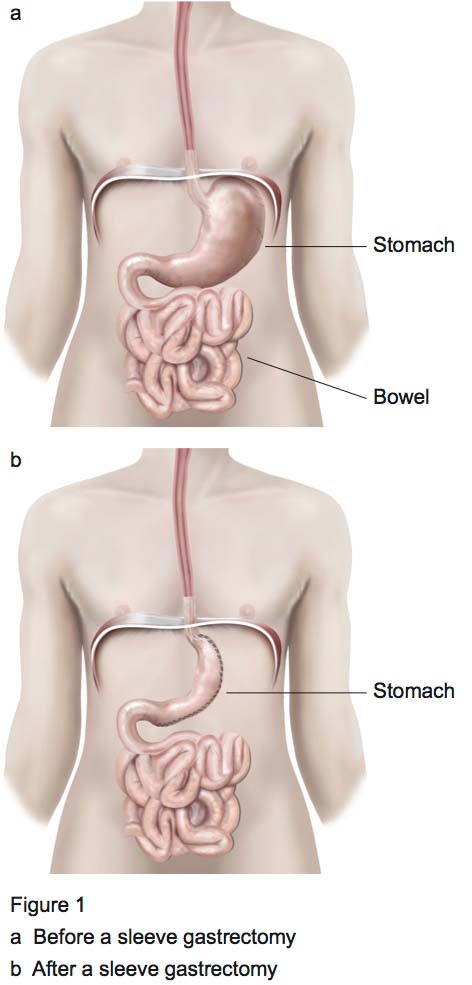This document will give you information about a sleeve gastrectomy. If you have any questions, you should ask your GP or other relevant health professional.
What is a Laparoscopic Sleeve Gastrectomy?
A sleeve gastrectomy involves reducing the size of your stomach to a short tube shape (see figure 1). It works by making you feel full sooner so that you eat less

Is a Laparoscopic Sleeve Gastrectomy Suitable For Me?
If your BMI score is over 40, surgery may help you to achieve long-term weight loss. Surgery may also help if you have a BMI over 35 and have other medical problems such as Type-2 diabetes, or high blood pressure.
Your surgeon will confirm your BMI score and carry out a detailed assessment before deciding if surgery is suitable for you.
What are the Benefits of a Laparoscopic Sleeve Gastrectomy?
You should be able to achieve long-term weight loss, but this depends on your ability to keep to your new lifestyle.
Long-term weight loss should improve most obesity-related health problems you may have.
Are There Any Alternatives to a Laparoscopic Sleeve Gastrectomy?
The simple approach to losing weight involves eating less, improving your diet and doing more exercise. Sometimes medication given by your GP can help.
There are other surgical options to a sleeve gastrectomy, such as gastric banding, shortening your digestive tract and a gastric bypass.
It may be possible to have a gastric balloon, but a gastric balloon can stay in place for only up to nine months.

The Procedure
What Does the Laparoscopic Sleeve Gastrectomy Involve?
The weight loss surgery is performed under a general anaesthetic and usually takes one to three hours.
Your surgeon will make several small cuts on your abdomen. They will insert surgical instruments, along with a telescope, so they can see inside your abdomen and perform the operation.
Your surgeon will pass a tube down your esophagus and into your stomach. They will use the tube to guide them while they use a stapling device to cut and seal your stomach.
Your surgeon will remove the excess stomach.
What Complications Can Happen?
General Complications of Any Operation
- Pain
- Bleeding
- Infection of the surgical site (wound)
- Unsightly scarring
- Developing a hernia in the scar
- Blood clots
Specific Complications of This Operation
- Damage to structures such as your bowel, bladder or blood vessles
- Surgical emphysema
- Developing a hernia near one of the cuts
- Staple-line bleeding
- Staple-line leak or making a hole in your stomach or bowel
- Sleeve narrowing
- Developing acid reflux
- Nutritional deficiencies

Following surgery
How Soon Will I Recover?
You should be able to go home after two to three days.
You will be able to take only liquids for a few weeks, progressing to soft food and then, after about four to six weeks, to solid food.
You should be able to return to work after two to four weeks, depending on the extent of surgery and your type of work.
Regular exercise should help you to return to normal activities as soon as possible. Before you start exercising, ask the healthcare team or your GP for advice.
On average, people who have a sleeve gastrectomy lose over half their excess body weight.
Summary
A sleeve gastrectomy may help you to achieve long-term weight loss. Success depends on your ability to keep to your new eating plan and exercising regularly.
To enquire about having Laparoscopic Sleeve Gastrectomy Surgery at New Victoria Hospital, call 020 894 9020 or fill out our contact form.
Acknowledgements
Author: Mr Ian Beckingham DM FRCS and Mr Philip Lockie FRCSI FRACS
Illustrations: Medical Illustration Copyright © Medical-Artist.com
The operation and treatment information on this website is published under license by New Victoria Hospital from EIDO Healthcare UK and is protected by copyright laws. Other than for your personal, non-commercial use, you may not copy, print out, download or otherwise reproduce any of the information. The information should not replace advice that your relevant health professional would give you.

Consultants and Clinic Times

Professor Marcus Reddy
Specialities
Related Specialities
Bariatric Surgery/Weight Loss Surgery
Bariatric surgery is a term for several surgical procedures to aid in the treatment of unhealthy weight gain and obesity. At New Victoria Hospital, through a selection of surgical treatment plans, our…









